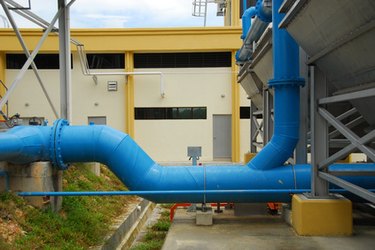
Today, being ecofriendly can apply to all sorts of venues in our everyday lives—from the clothes we wear to the food we eat. But what some people may not consider is how the water piping systems in our homes can affect the environment. There are several environmentally friendly materials for piping that can make a difference in more ways than one.
Copper
Video of the Day
Copper is considered to be an ecofriendly material for water piping because the installation of copper tubing does not require solvent-based adhesives that contain volatile organic compounds, which contribute to pollution and global warming and are considered harmful to your health. Copper can be recycled, and is therefore considered a renewable resource because it doesn't lose any chemical or physical properties. As long as it is disposed of properly, it can be an environmentally safe choice, because the process of mining copper can exhaust natural resources and ultimately cause pollution and emissions. Considering the high value of copper, individuals are more likely to recycle or sell their used copper, which is a plus for the environment. It is estimated that 80 percent of copper mined is still in use today.
Video of the Day
Cast Iron
Cast iron is an environmentally safe choice for piping, because it's made from 100 percent recycled metals, including remelted pig iron mixed with scrap metal and sometimes scrap steel. It is also recyclable, and the installation process requires no volatile organic compounds that are found in adhesives used to fasten most plastic piping. It's a durable and efficient form of piping due to its solidity and density.
Galvanized Steel
Galvanized steel is considered an ecofriendly choice because it can be melted and recycled. The galvanized coating on the steel, which is made of 98 percent zinc, is 100 percent recyclable and is what gives it its durability—the coating itself can last up to 40 years. The durability of galvanized steel also makes it a low-impact material, because little or no maintenance is needed for the lifetime of the piping.
PEX
Cross-Linked Polyethylene Tubing (PEX), like copper and cast iron, doesn't require soldering or adhesives that produce toxic fumes like PVC pipes require, making it environmentally friendly in that respect. It is quieter than PVC or copper, and has a temperature capability of 200 degrees Fahrenheit. On the other hand, PEX cannot be recycled, which is a huge downside when considering ecofriendly piping for your home.
Pipe Insulation
If you can't afford to replace your old pipe system right away but still want to reduce your environmental impact, tube pipe insulation is an easy and effective way to save energy. Pipe insulation helps to reduce heat loss by up to 80 percent, and will help sweating on cold water pipes. It will not only help the environment by saving energy, but will help you by saving your money.